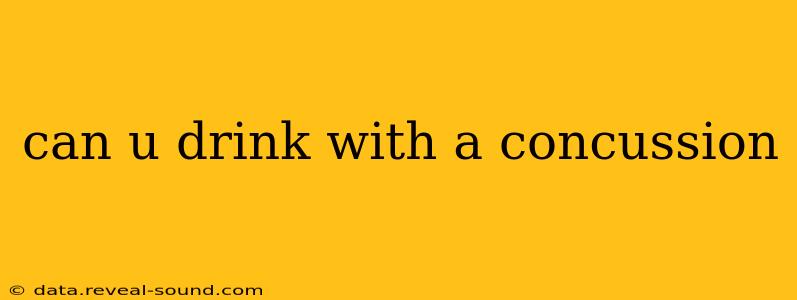Can You Drink Alcohol With a Concussion? A Definitive No.
The short answer is a resounding no. Drinking alcohol after a concussion is strongly discouraged and can significantly worsen your recovery. While the immediate effects of alcohol might seem negligible to some, its impact on the healing process is substantial and potentially dangerous.
This isn't just about a mild headache; concussions are traumatic brain injuries that require careful management. Alcohol interferes with this process in several key ways, potentially prolonging recovery time and increasing the risk of long-term complications.
What Happens When You Mix Alcohol and a Concussion?
Alcohol is a central nervous system depressant. This means it slows down brain function. After a concussion, your brain is already vulnerable and working overtime to repair itself. Adding alcohol further depresses brain activity, hindering the healing process. This can lead to:
- Increased Swelling: Alcohol can exacerbate brain swelling, which is a serious concern after a concussion. Increased swelling can put pressure on the brain, leading to further injury and potentially life-threatening complications.
- Delayed Recovery: Alcohol interferes with neurotransmitter function, slowing down the brain's ability to repair itself. This can lead to prolonged symptoms like headaches, dizziness, and cognitive impairment.
- Increased Risk of Secondary Injury: While recovering from a concussion, you're more susceptible to further injury. Alcohol impairs judgment, coordination, and reaction time, increasing the likelihood of accidents and further head trauma.
- Exacerbation of Symptoms: Many concussion symptoms, such as nausea, vomiting, and fatigue, can be worsened by alcohol consumption. Alcohol can also interact negatively with any medication you might be taking for your concussion.
What Are the Long-Term Effects of Drinking Alcohol After a Concussion?
The short-term effects are bad enough, but the long-term consequences can be even more serious. Research suggests a link between alcohol consumption after a concussion and an increased risk of:
- Post-concussion syndrome (PCS): PCS is a condition where concussion symptoms persist for weeks, months, or even years after the initial injury. Alcohol can significantly increase the likelihood of developing or prolonging PCS.
- Cognitive impairment: Studies have shown a correlation between alcohol use and long-term cognitive deficits after a concussion, impacting memory, attention, and executive function.
- Mood disorders: Alcohol can worsen existing mood disorders or contribute to the development of new ones, especially in individuals who have sustained a concussion.
How Long Should You Avoid Alcohol After a Concussion?
There's no magic number, as recovery time varies greatly from person to person. However, it's generally recommended to completely abstain from alcohol until you've been cleared by a medical professional. This usually involves a full neurological examination to assess your recovery progress. Rushing the process by consuming alcohol could set your recovery back significantly.
What Should You Do Instead?
Focus on rest, hydration, and a healthy diet. Get plenty of sleep, avoid strenuous activities, and follow your doctor's instructions meticulously. This includes any prescribed medication and recommended therapies.
Other Frequently Asked Questions:
Can I drink beer after a concussion? No. All alcoholic beverages should be avoided after a concussion, regardless of type or amount.
Can I drink wine after a concussion? No. Similar to beer, wine should be avoided entirely during your recovery period.
Can I drink just a little alcohol after a concussion? No. Even small amounts of alcohol can negatively impact your recovery. Complete abstinence is crucial.
When can I drink alcohol again after a concussion? Only after you have received full medical clearance from your doctor or neurologist.
In conclusion, avoiding alcohol after a concussion is not simply a recommendation; it's a crucial part of ensuring a safe and effective recovery. Your brain's health is paramount, and alcohol consumption puts this at unnecessary risk. Always consult with a medical professional for personalized guidance and ensure a thorough recovery.
